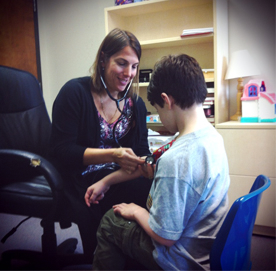ICCD offers expert speech-language assessment and therapy for children from pre-school through adolescence in a variety of disorder areas. A speech and language evaluation entails formal and informal assessment of skills and areas of particular concern. Following an evaluation, the speech-language pathologist will determine areas of weakness as well as a plan for intervention. Speech-language therapy is offered to children with fundamental communication difficulties as well as children with more subtle language challenges that may undermine verbal expression or the development of written language. Speech and language therapy occurs weekly and is tailored to the individual, focusing on targeting specific goals and improving below-average skills.
A speech disorder is when a person is unable to produce sounds correctly or fluently or has trouble with his or her voice. Examples include stuttering or difficulties producing certain sounds (articulation disorders).
A language disorder is when a person has trouble understanding others (receptive language) or has difficulties sharing wants/needs, thoughts, ideas, and feelings (expressive language). This also can include weaknesses with social communication (pragmatic language).
Augmentative and alternative communication (AAC) can be described as a multi-modal communication system that promotes understanding and use of language by means of personalized tools. An AAC device is recommended and customized to fully support the communicator’s needs. AAC includes both low tech (e.g. picture symbol communication, communication books) and high tech (e.g. tablets or devices that are dynamic and generate speech) to promote functional communication in everyday life.
Feeding therapy performed by a speech-language pathologist addresses a variety of issues, including increasing oral feeding to wean from reliance on gastrostomy and nasogastric tubes, improving sensory tolerance, developing chewing skills, increasing variety and volume of nutritional intake, and reducing avoidance behaviors during mealtimes. Feeding therapy begins with an evaluation of feeding skills, in which the therapist gathers background information, history of feeding difficulties, and medical history. The diagnostic evaluation is used to assess whether your child presents with a feeding disorder (dysphagia) by looking at your child’s feeding skills and profile, including progression from purees to solids, chewing skills, food preferences, avoidance and refusal behaviors, sensory profile, drinking skills, and variety and volume of food intake.
Speech-language therapy can also improve the skills of those diagnosed with:
- Autism Spectrum Disorders
- Language-based Learning Disabilities
- Non-verbal Learning Disorder
- Attention Deficit/Hyperactivity Disorders
- Developmental Delays
- Executive Functioning weaknesses, particularly as related to poor written expression
- Auditory Processing Disorders
- Dyslexia, phonological processing impairments, and poor reading comprehension
An abbreviated speech-language evaluation is used to assess a specific area of communication, typically to establish a starting point to set goals and measure progress for weekly therapy. A score report is provided with an outline of scores and highlighted areas of strength and weakness. If applicable, broad recommendations for speech-language therapy are given.
A pragmatic (social) language evaluation focuses specifically on social communication skills including perspective-taking, identifying and interpreting nonverbal cues, initiating and maintaining conversations, figurative language, and problem-solving. The assessment utilizes the Social Thinking Dynamic Assessment Protocol developed by Michelle Garcia Winner, as well as standardized measures. Many children who achieve average scores on language tests still present with social language deficits, and would benefit from a more targeted evaluation.
A comprehensive speech-language evaluation assesses many aspects of communication to determine if a speech-language disorder is impacting functioning in the home, school, or community. It provides detailed information on students who are having difficulty with language-based tasks. Testing is highly individualized based on parent and professional reports of current concerns, as well as a review of completed testing to date. Areas of focus may include:
- Receptive language (phonological awareness, listening skills, reading comprehension)
- Expressive language (grammar and syntax, formulation and organization, narrative language, and writing)
- Speech production (articulation and oral motor skills)
- Fluency (stuttering)
- Social communication (perspective-taking, conversation skills, problem-solving, flexible understanding/use of language)
The report accompanying a comprehensive evaluation will include a thorough review of previous testing, an overview of current test results, a summary and analysis of findings, functional goals and speech-language treatment plan, recommendations for related services, and suggested educational accommodations (all as appropriate). Reports can be shared at team meetings and used for implementing appropriate goals and related services in the school setting or privately.
Contact Christina Fulone, M.S., CCC-SLP at cfulone@iccdpartners.org with interest or questions regarding comprehensive evaluations.
Are you unsure if speech-language therapy is right for your child? An evaluation with a qualified speech-language pathologist is always the best place to start. See the linked list of developmental milestones and our list of red flag questions to determine if your child might benefit.
Speech & Language Intake Form






